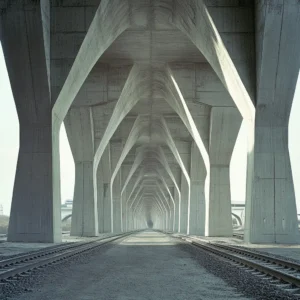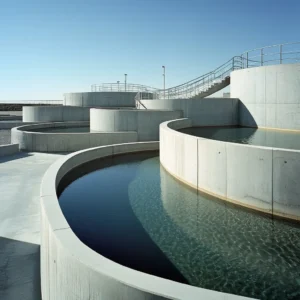Large-Scale Infrastructure
Introduction to Fiber-Reinforced Concrete in Large-Scale Infrastructure
Fiberego utilizes advanced fibers like polypropylene, polyester, steel, and cellulose to enhance the structural integrity of large-scale infrastructure projects, addressing the unique challenges posed by such massive constructions.
Key Applications of Fiber-Reinforced Concrete in Infrastructure
High-Rise Buildings
Incorporating Fiberego fibers into the concrete of skyscrapers improves their resistance to wind loads and seismic activities, ensuring safety and longevity.


Sports Stadiums and Arenas
Fiber-reinforced concrete provides enhanced durability and reduced maintenance costs for stadiums, supporting the heavy usage and dynamic loads experienced during large events.

Power Plants
For structures exposed to high mechanical and thermal stress, such as power plants, Fiberego fibers ensure concrete maintains its integrity under extreme conditions.
Ports and Harbors
Concrete reinforced with Fiberego fibers withstands the corrosive marine environment and heavy loads, crucial for the durability of ports and harbor structures.

Subway and Underground Structures
Using fiber-reinforced concrete in subways and tunnels enhances their ability to bear earth pressures and improves safety against infrastructure failures.

High-Speed Rail Infrastructure
Fiberego fibers contribute to the concrete durability needed for the high-speed rail infrastructure, accommodating high vibrations and loads.

Water Treatment Plants
In water treatment plants, fiber-reinforced concrete prevents structural damage from harsh chemical exposures, ensuring long-term serviceability.

Advantages of Fiber-Reinforced Concrete in Large-Scale Projects
Enhanced Durability and Strength
Fiber-reinforced concrete significantly increases the tensile strength and crack resistance of structures, which is vital for long-lasting infrastructure.
Economic Benefits
Reduced repair and maintenance requirements due to the high durability of fiber-reinforced concrete lead to cost savings over the lifespan of the infrastructure.
Future Trends in Fiber-Reinforced Concrete for Infrastructure
Technological Advances
Ongoing research and development in fiber technology are expected to further enhance the performance of concrete in large-scale construction projects.
Environmental Impact
Fiberego is committed to sustainability, with their fiber-reinforced concrete reducing the carbon footprint of construction projects and promoting greener building practices.
Conclusion: Fiberego’s Impact on Modern Infrastructure
Fiberego’s fiber technologies are pivotal in meeting the demands of modern infrastructure, offering solutions that combine innovation, sustainability, and reliability.


